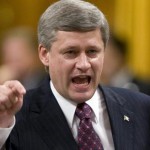
Liberals focus on Harper while NDP attacks inherent corruption of non-elected Senate.
by Ish Theilheimer and Samantha Bayard
OTTAWA May 23, 2013 (Straight Goods News) — Stephen Harper is in damage control mode. Last week, he escaped Ottawa for South America on a trade mission, leaving his ministers to nervously answer opposition questions about the Senate expense scandal — and the opposition vying to frame that scandal in a way that captures public favour.
The Liberals, under soaringly popular new leader Justin Trudeau, have focused on an increasingly isolated Stephen Harper. Today they called for answers to a set of questions intended to establish the true involvement of the Prime Minister and his staff in the Duffy affair.
The NDP, meanwhile, demands the RCMP conduct a criminal investigation and renewing its calls to abolish the Senate. Leader Tom Mulcair says the $90,000 payoff from Harper's chief of staff Nigel Wright to Senator Mike Duffy was probably illegal on more than one serious charge. At the same time, Mulcair blames the existence of the Senate for the problems, saying the Senate is unncessary and prone to ethical problems because it is an appointed body largely chosen by patronage. With Liberal Senator Mac Harb under investigation, as well as Conservative Senators Duffy, Wallin and Brazeau, the NDP hopes voters connect the Liberals with the Senate scandal.
"Throwing the bodies under the bus is not accountability, and crocodile tears from Peru will not do," deputy Liberal leader Ralph Goodale said at a news conference today. "All the thread here leads to the Prime Minister. He appointed these people. They were accountable to him."
The Liberals want answers from Harper, his former chief of staff Nigel Wright, any legal advisors to the prime minister’s office (PMO) alleged to be involved in an agreement, and from Conservative Senators implicated in whitewashing a Senate report on Duffy's expense claims.
Liberal caucus members list questions for Conservatives on Senate scandal. 
"If there are concerns about the process, and we simply send it back and the same people deal with it again behind the same closed doors I think Canadians will doubt whether that’s a fair and open process," said Liberal Senator James Cowan.
Meanwhile, NDP ethics critic Charlie Angus says the scope of the review is too narrow and there needs to be a full RCMP investigation.
"Whether secret payments were made to a politician which breaches many -- all — the ethical codes but also potentially the Criminal Code of Canada — that’s the issue that we really need to find out. Was it an attempt to influence the Senate? Was it an attempt to change an investigation, an internal audit investigation about taxpayer misspending of taxpayer money? That’s a serious, serious set of allegations. That’s where the RCMP need to be involved because the Prime Minister’s Office has clearly called in nobody," said Angus.
Angus has been wary from the outset of internal Senate audits that "can be monkey- wrenched and it was monkey-wrenched. So that’s a problem… Very, very key people around the Prime Minister pay a politician and then have an audit changed. That’s what the RCMP needs to look at."
The NDP's Charlie Angus calls for full investigation by the RCMP. 
On Wednesday, NDP leader Tom Mulcair unveiled a Senate abolition campaign called "Roll up the Red Carpet," with a website and online petition. Within hours of going live, it had received thousand of petitioners.
Mulcair condemned the Senate as an unelected body that can "reverse legislation that was duly adopted by people who have been elected," such as in 2010, when Jack Layton’s climate change bill was defeated by a Senate made up mostly of "party bag men and defeated candidates."
Tom Mulcair launches a campaign to abolish the Senate.
Mulcair acknowledges the difficulty of abolishing the Senate because it would require opening up the Constitution and, possibly, unanimous consent of all provinces and territories. "We know how complex it is going to be. If you don't start, if you are not serious about it you will never get it done."
The House has been raucous since the Victoria Day break, and especially since Wright's resignation on Sunday of the the long weekend.
On Tuesday morning, Harper gave a rare public speech to his caucus, unsuccessfully attempting to blunt the issue. "I’m not happy, I’m very upset about some conduct we have witnessed — the conduct of some parliamentarians and the conduct of my own office," he told his caucus. From that point, he went on to trumpet his party's achievements in office and evade the Senate expense issue completely.
Tom Mulcair was no more impressed than any other observers of federal politics. "This is a scandal that’s not going to go away," he told reporters. "We have the Prime Minister’s Chief of Staff in the Prime Minister’s Office with a taxpayer-paid lawyer concocting a document so that a Conservative-named Senator can avoid testifying properly before a Senate proceeding, and we’re not supposed to be able to see the document. It’s a supposed gift of $90,000. Nothing more is known about it so far. We want to get to the bottom of it. Canadians have a right to know… We know that this is a proper scandal. This Senate-gate is not going away."
In the House, Liberal Ralph Goodale charged, "This is about unethical, possibly illegal behaviour in the Prime Minister's inner circle. All of last week and again today the Prime Minister showed nothing but contempt for ordinary Canadians: no answers, no accountability, no apology. Ordinary Canadians do not have a sugar daddy in the Prime Minister's office. Ordinary Canadians pay their debts. Ordinary Canadians do not get to blockade an audit, whitewash a Senate report and pocket $90,000. Who gave the orders for this Conservative corruption and tabled the emails?"
Foreign affairs minister John Baird looked nervous, responding for the Prime Minister, who left after his caucus speech for a three-day trip to South America. Baird repeatedly said that he and his leader were unaware of what happened until it was reported in the news and that no documented agreement existed between Wright and Duffy.
NDP house leader Nathan Cullen said, "Canadians deserve answers. The Minister of Foreign Affairs is repeatedly saying, 'Two independent authorities are looking into the matter.' Can the Minister of Foreign Affairs tell us who these authorities are, and is one of them the RCMP? If not, why not?"
Under repeated questioning, Baird ultimately admitted one is the Ethics Commissioner and the other, the same Senate committee accused of whitewashing Duffy's report.
Justin Trudeau said the Conservatives are morally corrupt. "The problem remains– a member (the second highest or the highest) non-elected member of the executive paid off a parliamentarian $90,000 to obstruct an audit, to make a problem, a political problem go away. This is as serious as a heart attack."
Justin Trudeay says Conservative corruption is "as serious as a heart attack." 
When asked by Straight Goods News if the scandal is symptomatic of the patronage that goes with the Senate, Trudeau shifted quickly to criticizing Stephen Harper.
"I think it’s a mistake to focus too much on the Senate in this situation. I understand why the Conservatives want to turn it to the Senate. The problem is with the Prime Minister. The problem is with the Prime Minister’s Office, the most controlling, unaccountable office that we’ve ever had that is paying off parliamentarians to obstruct an investigation into improper expenses."
 Ish Theilheimer is founder and publisher of SG News and lives in Golden Lake, ON. Samantha Bayard is an Ottawa reporter and an editorial and administrative assistant at SGNews.
Ish Theilheimer is founder and publisher of SG News and lives in Golden Lake, ON. Samantha Bayard is an Ottawa reporter and an editorial and administrative assistant at SGNews.








